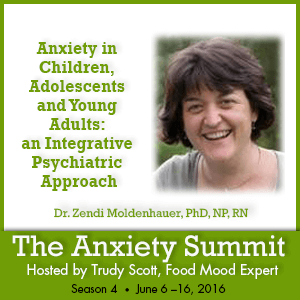
Dr. Zendi Moldenhauer, PhD, NP, RN, is interviewed on the Anxiety Summit by host of the Anxiety Summit, Trudy Scott, Food Mood Expert and Nutritionist, author of The Antianxiety Food Solution.
Anxiety in children, adolescents and young adults: an integrative psychiatric approach
- The incidence of anxiety in children: official stats and real life numbers
- How to identify anxiety in children and the IBS-anxiety connection
- Medication over-prescribing, hidden side-effects and electroshock
- Food, toxins, gut health, the adrenals and an integrative approach
- How to use calming theanine and GABA
Here are some gems from our interview:
…anxiety disorders in children are probably the most common psychiatric disorders that start in childhood. And depending on studies and depending on how anxiety is defined the rates are anything between 10 to 30 percent. Less common in younger ones and more common in teenagers. But really the lifetime prevalence of that is a child or teenager developing anxiety sometime up to age 18 is somewhere between 25 and 30 percent. That means one in three to one in four children or adolescents at some point during that time period which is very high.
…when somebody has an anxiety disorder they’re more like to have more than one anxiety disorder because they could have generalized anxiety disorder or social anxiety disorder or separation anxiety or panic disorder. So it’s really very common like up to 60 percent of patients with anxiety disorder can have another anxiety disorder or depression or ADHD.
And that’s just sort of more the mental health disorders. There’s also an incredibly high association between anxiety and IBS. In fact nearly half to three-quarters of children with IBS can have anxiety. So there’s a huge relationship between anxiety and other mental health disorders but anxiety and other physical disorders like gut issues or headaches for example.
Here are some of the studies we discuss related to IBS and anxiety:
- Relationship between irritable bowel syndrome, worry and stress in adolescent girls
- Symptom Profiles in Patients With Irritable Bowel Syndrome or Functional Abdominal Pain Compared With Healthy Controls
Dr. Zendi shares that children can’t necessarily identify that they’re anxious:
Children with anxiety can often not express that they’re anxious. And if you can imagine a five or six or seven year old they don’t necessarily come to us and say mommy, I feel anxious about whatever is going on in their lives. So often with children we see it through their behavior. So children who are either nonverbal at all or haven’t yet developed the emotional language to describe anxiety act out anxiety. So you might see a child that’s more withdrawn and doesn’t want to participate, doesn’t want to leave the house, doesn’t want to get on the school bus, doesn’t want to go to school, doesn’t want to participate in activities. There’s a lot of avoidance kind of behavior.
We discussed this article in Scientific American – The Hidden Harms of Antidepressants: Data about the true risks of suicide and aggression for children and teens taking these drugs have been suppressed
And this one about ECT: American Psychiatric Association Lobbies FDA to Electroshock Children https://www.cchrint.org/2016/05/05/apa-lobbies-fda-to-electroshockchildren/
We covered organic food and the EWG dirty dozen list for fruits and vegetables
Dr Zendi’s go to nutrient for anxiety and adrenal dysfunction is theanine:
which is an amino acid derivative from green tea and it’s thought to really cross the blood brain barrier and exerts a variety of neurophysiological and even like pharmacological effects on the brain in terms of its anxiolytic and calming effects because it actually upregulates inhibitory neurotransmitters like GABA and possibly modulates serotonin and dopamine in specific areas of the brain. It actually also increases alpha wave activity. So children can either sleep better because they’re sleeping at a deeper level or they feel more calm and focused during the day without feeling drowsy so there’s no side effect to L-Theanine which is great.
Here are two of the theanine papers we discussed:
- The effects of L-theanine (Suntheanine®) on objective sleep quality in boys with attention deficit hyperactivity disorder (ADHD): a randomized, double-blind, placebo-controlled clinical trial.
- A randomized targeted amino acid therapy with behaviourally at-risk adopted children
Here is Dr. Zendi’s digital gift: Practical Tips for Parents of Children and Teens with Anxiety and Irritable Bowel Syndrome (IBS)
If you are not already registered for the Anxiety Summit you can get live access to the speakers of the day here: www.theAnxietySummit.com
Missed this interview or can’t listen live? Or want this and the other great interviews for your learning library? Purchase the MP3s or MP3s + transcripts and listen when it suits you.
You can find your purchasing options here.: Anxiety Summit Season 1, Anxiety Summit Season 2, Anxiety Summit Season 3, and Anxiety Summit Season 4.